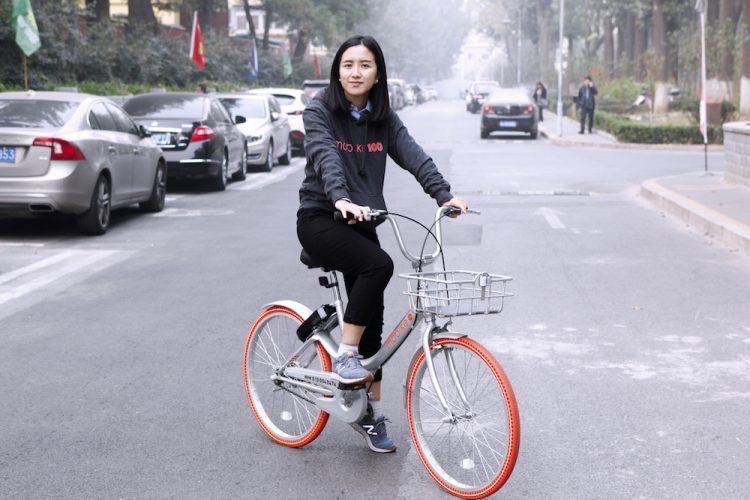
Photo credit: Mobike.
“You wouldn’t be here unless you were thinking about entering Japan market, right?”
The question from the moderator was a gentle nudge for Chris Martin, head of international for Mobike. Martin, whose personal SEO has been overshadowed by a certain singer, is the British, tri-lingual (English, Chinese, Japanese) leader of Mobike’s global expansion. Though he stopped short of a definitive answer, Martin did share his thoughts on the opportunities and challenges of expanding into the Japanese market during the Infinity Ventures Summit in Kobe, Japan.
Mobike is considering Japan at a time when it is riding a wave of positive growth. With investors like Tencent, Foxconn, and Sequoia China providing US$325 million of disclosed funding, its valuation likely exceeds US$1 billion. According to Martin, usage rates have skyrocketed in the startup’s 14 months of existence. The most recent metrics show 4.5 million bikes are serving 20 million rides a day.
Mobike’s rapid scale has been fueled by Chinese consumers, but it could find a welcoming user base in Japan as well. Bicycles are widespread and seen as a common form of transportation. According to the from the Ministry of Transportation, bike ownership has been steadily rising. The latest figures cite 72 million bikes covering about 56 percent of the population.
The concept of the sharing economy is also becoming more widely accepted in Japan. Airbnb’s success here is well documented, but local startups are also gaining steam. Businesses that connect buyers and sellers for various goods and services like parking spaces, meeting rooms, and reservations steadily attract funding.
The sharing economy as a whole is expected to reach US$42 billion in value by 2018, approximately doubling since 2014. The industry is even organized under a Sharing Economy Association which seeks to educate and engage public and private stakeholders.

On your bike: Hu Weiwei, Mobike co-founder and president. Photo credit: Mobike.
Expansion roadmap
Even so, can Mobike be embraced in Japan?
To Martin, it is possible – with a caveat. “Chinese companies that just take their current business and put it in Japan are definitely going to fail. Put aside for a moment the fact that it’s a Chinese company. I have to ask myself if the service is even beneficial to users in a given city,” he says.
Martin suggested Tokyo’s smoking areas could offer a lesson in providing value. Meant to reduce public nuisance from second-hand smoke and abandoned cigarette butts, designated smoking areas dot Tokyo’s cityscape. Much in the same way they provide a public service by making a space to stop and smoke, it is conceivable that Mobike can provide value by supplying space for parking bicycles.
There is some competition for that real estate, however. Local bicycle sharing startups like Docomo Cycle are becoming more popular. The map of bike-sharing locations in Tokyo turns the city into a pincushion on Google maps.
“It can be Brazil, India, Japan, or Silicon Valley…in a lot of countries there are VCs gathering money in order to execute a copy of this model,” Martin says, explaining his expectation of a crowded playing field. He offers a word of warning to those startups, noting that they often skip the key step of gaining the approval and support of local governments.
Governments can be essential in securing bicycle parking locations. Without those, bicycles often get abandoned, leading to municipal fines. “You need to fully respect the government when it comes to public spaces. Otherwise you will fail,” Martin stresses. In fact, In a move reminiscent of ride-hailing company GoJek’s tie-ups with Jakarta’s public transportation, Mobike opened up its data to Beijing to improve bus routes as part of its efforts of deepening government relations.
That is one of the reasons why, if the time comes for Mobike to extend its service in Japan, Docomo Cycle should not count on a soft landing via acquisition. Rather than use venture capital to go on a startup shopping spree, Mobike is more likely to invest in strengthening its data analytics and IoT technology to better serve its users and how their behaviors impact other industries.
“For the next level, I’m excited to see how can we use this user data and IoT data to do something even more interesting,” Martin concluded.
This is part of our coverage of Infinity Ventures Summit, taking place in Kobe on June 7 and 8.
This post Will Japan get swept up in China’s bike-sharing craze? appeared first on Tech in Asia.
from Tech in Asia https://www.techinasia.com/mobike-japan-expansion
via IFTTT
No comments:
Post a Comment